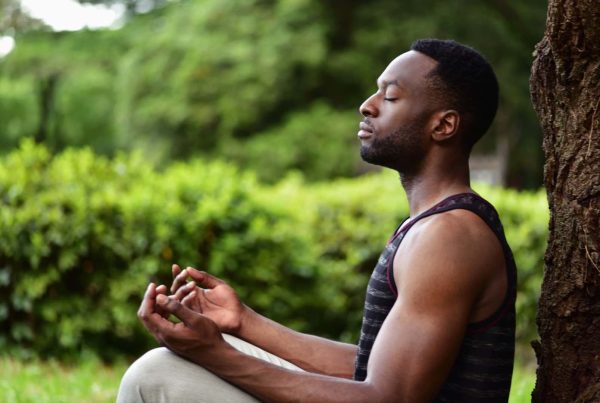It doesn’t matter whether you’re a beginner, or have been meditating for a while, it’s not easy to do. It takes time, practise, and patience to develop.
Frustration is a common feeling when trying to meditate. Especially for those starting out who have little guidance or understanding. So, please don’t fret, it’s a completely normal reaction. I also struggled in the early days.
Why exactly does frustration and agitation occur during meditation? There can be many reasons which I’ll explain in this article. As well as giving you solutions so you can learn to meditate the correct way.
Discomfort Can Distract
There’s nothing worse than feeling uncomfortable when meditating. It’s off-putting.
During meditation you want to be sitting down. This doesn’t mean you have to pose in a lotus position like an experienced yogi or monk. This is a difficult position to sit in for extended periods of time, so get that image out of your head!
You can either have your legs crossed whilst seated on the floor, sofa, or bed. Or sit like normal with your feet touching the ground, but don’t slouch backwards into the seat. Good, upright posture is important.
Why? Because you need to be in a state of focus and alertness, not half asleep. But, even trying to stay upright for 10+ minutes can feel uncomfortable. Especially if you have any kind of back pain.
Adjust Accordingly
You can incorporate the discomfort into your practice by paying attention to it. Allow the aches and pains to happen. Explore them deeply. Focus on those parts of the body, breathe into them. As you inhale, imagine yourself healing. As you exhale, envisage the pain leaving your body.
If you feel uncomfortable or find it challenging, adjust your space accordingly. Place some support behind your back using some cushions or pillows. Use them to help you sit upright, don’t sink into them. Are you cold? Use a blanket or wear something warmer. You get the idea.
You don’t need to have that perfect lotus posture to meditate correctly. If you’re upright and not slumped backwards, then that’s a great starting point.
The next time you begin meditating, focus on your body. Ask yourself, ‘does it feel uncomfortable?’. If so, that’s ok. Either go with the flow, or adjust your body position and space.
Unrealistic Expectations Cause Frustration
When discussing meditation, I often hear ‘I tried to meditate but I couldn’t stop thinking, so I gave up’. Let me clear this up once and for all. Meditation IS NOT about trying to clear your mind from thought.
Experienced meditators can have short periods of little or no thought, but it’s impossible to stop thinking entirely.
Our minds -whether we like it or not- unconsciously generate thoughts. This is something we have zero control over. Many people’s minds even conure up thoughts that are counterintuitive.
They judge themselves too harshly. Criticise everything they do. Or catastrophise, worry, and think negatively
It’s common people starting meditation and expect they’ll be in a state of zen. This isn’t realistic though. What’s the best approach to take then?
Understand the Practice Better
Learn what the practice is about. Mindfulness meditation involves paying attention to what’s happening in the present, without judgement. That can include the internal workings of the body and mind, as well as what is going on externally.
You learn to observe thoughts coming in and out of your awareness, instead of trying to suppress them. Meditators often use their breath as anchor to ground themselves to the present.
Try this. As your mind wanders say ‘here’s thinking’ and gently guide your focus back to the breath. This is how the practice goes. In fact, it’s the only way to get better at it.
By doing so you develop self-awareness, and strengthen your muscle of attention.
A lot of people don’t understand this approach. Instead, they get frustrated that they can’t stop thinking and getting distracted. But this is how your mind works. Don’t beat yourself up.
Overtime you will get better at staying grounded in the present moment. Stick with it.
“Feelings come and go like clouds in a windy sky. Conscious breathing is my anchor.”
— Thich Nhat Hanh
External Disturbances Can Deter
You plan some time and space to meditate during your day. Suddenly you’re aware of the noises all around you. It could be from your children, partner, neighbours, cars, pedestrians, alarms, or roadworks. Modern day life is noisy.
Embrace Sounds or Focus on the Silence
Of course, it’s helpful if you can find a quieter space to meditate but this isn’t always possible. So, what do you do? Incorporate the noises into your meditation. That may sound absurd but let me explain.
Remember what I said earlier? Mindfulness is about accepting the present moment as it is, without judgement. Instead of these noises being a source of resistance and complaint: ‘I can’t stand the sound of that alarm’. ‘There goes my neighbour again with the lawnmower!’.
Use them to your own benefit as part of the practice. Focus on the sounds intently. Explore the vibrations, the tone, the texture. Pinpoint the exact location of each sound in your hearing field.
Another great tip is to listen to the silence in-between the sounds. Sounds, like thoughts come and go. When they do fade away, there is stillness and peace sitting underneath. Notice it. Now the sounds don’t seem so intense.
Paying attention to outer silence creates inner silence and presence. Give it a go the next time you find distracting noises during your practice.
“To listen to the silence, wherever you are, is an easy and direct way of becoming present. Even if there is noise, there is always some silence underneath and in between the sounds.”
— Eckhart Tolle
Feeling Full or Hungry?
Are you hungry or full? Either can be a distraction when meditating. If you’re too full, you’ll be feeling bloated and comfortable. If you’re starving, your body and mind will be craving food. Something to be aware of.
Accept the Feeling, or Choose a Better Time
Like the pains and aches that can occur during discomfort. You can also use the feeling of hunger or being full as a source of focus. Instead of resisting the feeling, turning it into an excuse to stop meditating, or making it a source of complaint.
Otherwise, choose a time to mediate after you’ve eaten. Make sure your body has had a chance to digest your food first though.
Feeling Restless or Bored?
We live in an age where we have an endless amount entertainment available at our fingertips. Instant gratification is around every corner.
But during meditation you’re sitting alone with your mind and body. You’re not preoccupied doing a task. You have to confront your thoughts, emotions, and feelings. At first this can feel daunting, intimating, and unusual. Some people even freak out.
It’s natural to feel bored, or restless, like you can’t wait for it to be over. You may even feel the need to start scrolling on your phone to distract yourself. What do we do then?
Congratulate Yourself and Be Curious
Appreciate that meditating will bring you many benefits. Increased memory, focus, concentration, more self-awareness, calmness, stillness, peace of mind. It also brings a sense of achievement and gratification because it can be challenging. Congratulate yourself for doing it.
“Nothing worth having comes easy.”
― Theodore Roosevelt
Accept that not all meditations will go smoothly. Even for experienced meditators, if they have a lot going on, it can still be difficult to settle the mind.
Find interest in what’s going on. Explore your body, the sensations and feelings occurring within. How does your body feel? Can you feel it’s heaviness in the chair? Does the chair feel supportive?
Pay attention to external sounds, smells, colours, shadows, shapes. How is your mind? Is it chaotic and busy, or still and calm?
Be curious about everything arising in the present moment. I promise you, if you really pay attention, it won’t seem so boring after all.
Your Ego Dislikes Meditation
Ah the ego. That part of you that related to you and your identity. Your name, age, personal story, your personality. Essentially your sense of self within this society.
Your ego is an important part of us because it helps you to survive and make sense of the world. But it can get in your way when it gets out of control. Egomaniacs can become full of themselves, self-centred, selfish, and unkind.
Your ego will also try to get out of anything that it perceives as a threat to itself. When doing so it can be very deceptive, cunning, and convincing. Meditation falls into that category. Why? Because it’s about letting go of the self and becoming more in tune with the true nature of reality.
What does that even mean? Well, on the surface meditation can improve our own mental health and well-being. But on a deeper level it’s more of a spiritual practice that helps us to let go of form and identity. It empowers us to recognise and reconnect with the stillness that lies within the all beings.
The ego doesn’t like this because it doesn’t want to dissolve or be forgotten. So, it will try to convince you meditation is a waste of time. That it’s pointless and will never to work for you.
Be Alert
Be aware of this. When your ego starts to speak up and complain, acknowledge it. Say ‘ah yes, here goes my ego again’. Accept that it’s there and move on.
Learn to let go. As I I mentioned earlier, recognise that thoughts will come and go. The thoughts and complaints your ego produces will also dissolve. As you meditate, you’ll transition through the settling, grounding, and resting phases.
When this happens, meditation can be a blissful experience
Meditation Doesn’t Have to be Frustrating
I hope you now understand how to feel less frustrated when meditating.
Let’s recap. Meditation is the practice of paying attention to the present moment without judgement. Have I said that enough? Feeling comfortable is important. It’s normal to feel restless, bored, or like you’re not doing it correctly. Especially if you don’t understand the purpose of meditating.
Incorporate distractions and sounds into the practice. Be mindful of your stomach. And always be aware and alert how your ego will try to disrupt your meditation.
Meditation isn’t easy, but stick with it and will reap the benefits.
Did any of the pointers in this article resonate with you? And did you find the solutions helpful? I’d love to hear your thoughts in the comments below.
Take care of yourselves,
Chris from Mindful Way to Be



